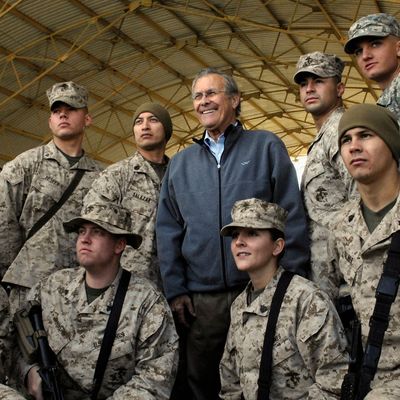
Donald Rumsfeld didn’t lack belief, or conviction. In the words of the oft-quoted Yeats poem, the worst are full of passionate intensity. He believed in an exceptional America, he believed in the might and power of our armed forces, and he believed, too, that might and power are a kind of permission. A nation should do what it pleases if it can, as long as it’s right — and Rumsfeld’s America was always right. What kind of world did Rumsfeld’s belief help build? On the occasion of his death, this is a question worth asking.
Before the hagiographies commence, before the scolds complain that the left is being too harsh, examine the world as it stands today because of Rumsfeld. Iraq remains a war zone almost 20 years after the then-defense secretary shrugged off widespread looting in Iraq with a flippant “stuff happens.” The war on terror has endured for so long that it has embedded itself in our national functionality like a worm in a rotten piece of fruit. It is impossible to fathom what and where we would be without the wars that Rumsfeld orchestrated, and equally impossible to tell what we’ve gained. The answer, seemingly, is nothing but death. Destruction and war, decades of it.
Iraq will be Rumsfeld’s legacy, with all of the lies, all of the torture, all of the killing. While many hands bear responsibility for such loss, two belonged to Rumsfeld, who had Saddam Hussein in his sights for years before 9/11 gave him the excuse he’d wanted to attack Iraq. Rumsfeld lived out the rest of his days with his impunity. His victims weren’t so lucky.
And there are so many of them. The prospect never seemed to bother him, much as he treated war itself like an easy jaunt in the park. “Reports that say that something hasn’t happened are always interesting to me, because as we know, there are known knowns,” he said incoherently in 2002, implying that Iraq was arming terrorists. “There are things we know we know. We also know there are known unknowns. That is to say, we know there are some things we do not know. But there are also unknown unknowns — the ones we don’t know we don’t know.” Even now, years later, Rumsfeld’s infamous quote is difficult to decipher. It offends precisely because it’s near gibberish. Rumsfeld’s justification for war — that Iraq was developing stockpiles of weapons of mass destruction — rested on lies and garbled explanations to the public.
For Iraqis, the results of Rumsfeld’s conduct were catastrophic, with hundreds of thousands of people killed as a result of the U.S.-led invasion. More than 4,000 Americans have died as a result of Operation Iraqi Freedom, and many more injured. The damage to the United States was also insidious — no country can kill and torture as freely as the U.S. has done without sacrificing its moral conscience in the process.
In 2015, Rumsfeld told the Times of London in an interview that the belief “we could fashion a democracy in Iraq seemed to me unrealistic,” that he was “concerned about it when I first heard those words … I’m not one who thinks that our particular template of democracy is appropriate for other countries at every moment of their histories.” This was, as the Guardian observed at the time, something of a reversal for Rumsfeld. Mere months after the U.S. invaded Iraq, the then-secretary of defense told the Council on Foreign Relations that Iraq “could conceivably become a model — proof that a moderate Muslim state can succeed in the battle against extremism taking place in the Muslim world today.” This obviously did not happen. Maybe it never would have happened; the idea that anyone can force self-government upon people at gunpoint beggared belief.
Consequences eluded Rumsfeld the rest of his life. Like George W. Bush, Rumsfeld enjoyed something of a reputation as an elder statesman. Like Bush, he even picked up a hobby in his elder years: He released an app called Churchill Solitaire in 2016. He announced this in a Medium post. “Churchill Solitaire is not a game for everyone,” he warned. “It takes patience and perseverance, cunning and concentration, and strategy and sacrifice.” He was a very good player, he pledged. But geopolitics isn’t a card game; there were lives attached to every move he made. He degraded those lives, and he degraded himself, and he degraded the nation he was so eager to serve. Rumsfeld dealt torture and death, then moved on like it was nothing. Stuff happens.






























